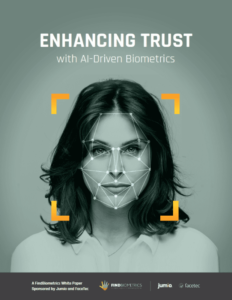Two of the biggest names in biometrics have issued a joint White Paper detailing the benefits of AI-driven face authentication.
The paper, entitled “Enhancing Trust with AI-Driven Biometrics“, is jointly presented by FaceTec and Jumio, ID verification and authentication specialists leading the current digital onboarding trend with remote enrollment, face authentication and biometric liveness technology. Artificial Intelligence plays an enormously important role in their solutions, and accordingly, it’s a major focus of the paper.
Available as an e-book, the paper builds on the idea of the “trust anchor” explored in the previously published White Paper “Trusted Identity From Start to Finish“: essentially, the idea is that strong authentication starts with the foundation of an anchor document that provides reliable identity assurance. Establishing a link between the end user’s face and this anchor – a passport or a driver’s license, for example – allows for the creation of a “trust chain” in which authentication can reliably be performed at any point going forward.
This is pretty straightforward when it comes to selfie authentication, since an end user’s face can easily be matched to an accompanying document. But for the highest level of security and end user convenience, sophisticated AI is required – AI that can quickly map an individual in three dimensions and in a range of lighting and other environmental conditions, and that won’t be thrown off by subtle differences between the end user and the image in their accompanying document.
“Enhancing Trust with AI-Driven Biometrics” delves into what this kind of AI looks like and how it works, including the importance of ‘liveness detection’ capabilities that allow AI systems to spot fake artifacts that are meant to trick the authentication system. The paper also takes a bit of time to address broader societal concerns about AI and facial recognition, and to differentiate the more controversial systems from the kind of AI that enables convenient and secure selfie authentication.
“Thanks to large-scale data breaches, the dark web, and sophisticated crime rings, the notion of relying on static databases for identity proofing — many of which have also been compromised – simply no longer makes practical sense,” said Dean Nicolls, Vice President of Global Marketing for Jumio, commenting on the publication.
“Admittedly, switching from database pings to AI-powered identity verification does represent a pretty significant sea-change,” he added. “But, now is the time to dive into the deep end and adopt stronger, biometric-based approaches to identity verification and ongoing user authentication. This eBook provides some important insights about the mainstreaming of biometrics and AI and why modern enterprises are abandoning traditional ways of identity proofing new and existing customers, and deploying modern AI-based approaches that deliver significantly higher levels of identity assurance.”
The paper comes at a crucial time for education in the biometrics and identity-adjacent industries, particularly around facial recognition. Growing controversy over the use of facial recognition by law enforcement is necessitating the purposeful demarcation between surveillance applications and the face-based authentication discussed in the paper.
“With digital onboarding for new accounts now commonplace, and hundreds of governments working on digital identity initiatives, even the average consumer inherently knows the difference between Face Authentication they perform with their phone and surveillance software running on security cameras they don’t control,” said Kevin Alan Tussy, CEO of FaceTec. “The former protects our privacy; the latter threatens it.
“FaceTec provides the fundamental biometric technology that has allowed digital transformation to happen securely by providing our patented 3D Liveness Detection and world-leading 3D Face Matching accuracy, while continuously educating through articles and White Papers, and at Liveness.com.”
At a time when this kind of technology is being embraced more widely than ever, the paper is well worth a read for those who are new to the topic of AI-driven biometrics.
—
(Originally posted on FindBiometrics)


Follow Us